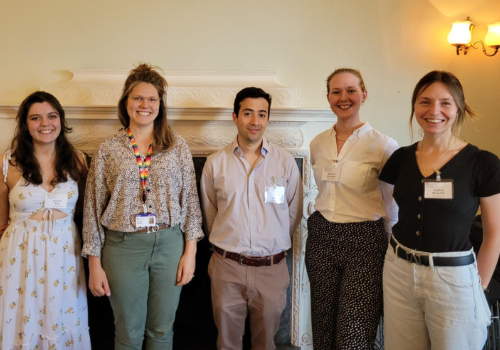The Elizabeth Blackwell Institute scheme, which started in 2012 thanks to funding from Wellcome Trust, is aimed at medical, veterinary and dental graduates. It is designed to give early career clinicians the chance to experience a world-class research environment for the first time.
Sarah Blackmore, Elizabeth Blackwell Institute Funding Officer says: “The majority of our Clinical Primer scheme awardees decide to continue with a career in research, which is fantastic.”
She explains: “To date we have funded 55 projects, over 12 separate calls, awarding more than £1,828,581 in funding. Of these, 44 awardees have completed their projects, with many going on to secure further funding. For example, 10 of our Clinical Primer scheme awardees have since received NIHR Academic Clinical Fellowships and 17 have been awarded PhD fellowships. All in all, follow-on research funding totals over £6 million so far.”
“But it’s more than just money,” she continues, “the scheme has allowed people a window into what it is like to be a researcher, to decide if it is the career for them, and provide them with the support they need to continue on this path if they choose to.”
Zoe Cortes, a veterinary surgeon from the University of Bristol, investigated how nasal cells might help in the treatment of spinal cord injury with her Clinical Primer award in 2019. She says the scheme has been a great introduction into research. “It allowed me to become more independent as a clinician as well as a scientist. It gave me the freedom to explore, design and implement my own experiments as well as problem-solve when things didn’t go to plan! The scheme was the perfect opportunity for me to delve into research, and it provided the perfect springboard to a career as a clinical academic.”
But what about the research happening this year? Here is a list of our current awardees and their areas of research.
Eleanor Best ‘Natural Product Antibiotic Drug Discovery: Exploring deep sea microorganisms and associated metabolites as potential sources for the development of novel antimicrobial agents’
Daniel Castillo ‘Using gene editing to understand erythropoietin receptor signalling’
Frances Edwards ‘Exploring genetic mechanisms underpinning diagnostic uncertainties in susceptibility to piperacillin/tazobactam’
Anna Gordon ‘Sexual Health Amongst Syrian Refugees in the Beqaa Valley’
Suzanne Harrogate ‘Perioperative tobacco-cessation in people undergoing vascular surgery’
Eben Jones ‘Investigating the impact of metformin in modulating the metabolism of T cells in dengue patients with obesity’
Sophia Muschik ‘Feasibility and acceptability of data collection from (patient-clinician-family) conversations in which decisions regarding high-risk emergency interventions are made’
Miranda Rogers ‘Nanoparticle Gene Therapy for Autosomal Dominant Polycystic Kidney Disease’
Laura Skinner ‘Investigating the role of glomerular endothelial glycocalyx dysfunction in the renal injury of pre-eclampsia’
We spoke to a couple of the awardees about their projects.
Suzanne Harrogate explains: “Surgical waiting lists are an opportunity to help patients prepare for the physiological demands of surgery. My project will use qualitative methods to explore perioperative tobacco cessation in vascular patients.”
Daniel Castillo said: “I am grateful to the Elizabeth Blackwell Institute for the opportunity to work in the research laboratories of Professors Jan Frayne and Ash Toye. For my Clinical Primer project, I will use CRISPR Cas9 mediated gene editing and immortalised erythroid cell lines to investigate the regulation of erythropoietin receptor (EpoR), which mediates critical signalling events in erythroid progenitor cells. I hope my work will uncover new understanding and strategies for enhancing the yield of in-vitro cultured erythrocytes for manufacturing blood products for transfusion medicine.
The Clinical Primer scheme is supported by a Wellcome Trust ‘Institutional Strategic Support Fund’ award to the Elizabeth Blackwell Institute and the University of Bristol.
Read about previous Clinical Primer project case studies.

